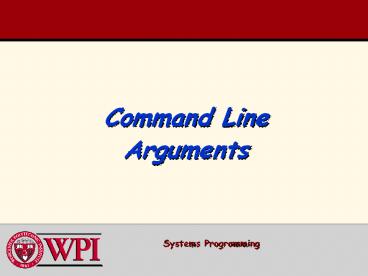Command Line Arguments - PowerPoint PPT Presentation
Title:
Command Line Arguments
Description:
Command Line Arguments – PowerPoint PPT presentation
Number of Views:64
Avg rating:3.0/5.0
Title: Command Line Arguments
1
Command LineArguments
Systems Programming
2
Command Line Arguments
- A C program must always have a function named
main. This function is directly invoked by the
Linux/Unix system. - main has two arguments conventionally named argc
and argv. - The argc argument is of type int and corresponds
to the number of arguments provided on the
command line (including the program name as the
first argument).
Systems Programming
2
3
Command Line Arguments
- The second argument to main, argv, is an array of
pointers to strings. - Each string contains the ASCII string
representation of what is typed on the program
command line.
Systems Programming
3
4
Command Line Arguments
- For example, if the command line typed is
- ./prog3 file1 200
- argc will have the value 3
- and
- argv0 points to string ./prog3
- argv1 points to string file1
- argv2 points to string 200.
Systems Programming
4
5
Command Line Arguments
- It is standard and a safe programming practice
for main to immediately check to see if it has
received the correct number of arguments from the
Unix command line. - If there is a mismatch, main prints out a proper
usage statement and immediately ends the program.
6
Command Line Arguments
- For command line arguments intended as integer
parameters to the program, the ASCII string
representation of that integer has to be
converted to an integer using the standard
library function atoi.ascii-to-integer - See pages 333-334 in DD for complete syntax and
an example of atoi usage.
7
A Command Line Argument Sample Program
/ An Example of the Use of Command Line
Arguments / include ltstdio.hgt include
ltstdlib.hgt define SIZE 100 int main (int argc,
char argv) int i, samples, tableSIZE
char samstring, timestring / strings are
needed / char progstring if(argc !
3) printf("Proper Usage is com-arg samples
time\n")
Note main function arguments
Check number of arguments
8
A Command Line Argument Sample Program
else progstring argv0
samstring argv1 timestring argv2
printf("Program s\n", progstring)
samples atoi(samstring) / convert to
integer / printf("Please enter d
samples\n", samples) for (i0 i lt samples
i) scanf("d", tablei) for (i0
i lt samples i) printf("sampled
d\n", i1, tablei) printf("Time d\n",
atoi(timestring)) return
./com-arg 3 500 Program ./com-arg Please enter
3 samples 745 1023495 2 sample1 745 sample2
1023495 sample3 2 Time 500
9
Command Line Arguments
- Using command line arguments to specify variable
size for input parameters is a preferred
technique. - Remember C treats the arguments as ASCII strings.
- Use atoi to convert the strings to integers.































